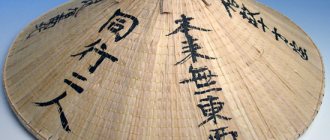Basically, the Japanese use first and last names with nominal suffixes. There are some exceptions here, but more on that later.
In general, the topic of nominal suffixes is huge and there are a lot of nuances that are better to learn in life, rather than in theory. However, in this article I will try to theoretically break down some points and bring a little clarity to this topic.
We won’t go into everything, we’ll go over the top so as not to drag out the article.
Let's start with the most popular nominal suffixes: san, kun and chan .
Suffix "San"
For example, Yamada-san. The suffix “San” is a neutral polite style. It can be compared to some extent with a conversation on “you” .
That is, in essence, the suffix “ San ” is used by juniors in relation to elders; when speaking on equal terms, in official address, whether it is a stranger or a work colleague, they usually use “ San ”.
However, it is worth clarifying here that when using “ San ”, this may not always mean official communication. But let's hold that and move on to the " Tian " suffix.
On June 16, a US-Russian summit took place between President Biden and President Putin. The international community has given it unprecedented attention.
In the context of the aggravation of the American-Chinese confrontation, the interest of the whole world was raised by the question of whether the United States would agree to at least some restoration of relations with Russia, which, together with China, the West had declared a tyranny.
According to the world media and the expert community, the United States is seeking to improve relations with Russia in order to avoid a war on two fronts with Russia and China.
However, US-Russian relations remained “persistently hostile” for most of the 20th century and, ironically, it was these persistently hostile relations (or tensions) that made the “long peace” possible in the bygone century.
However, the fact that the conflict between the United States and China is growing does not mean that the United States should try to get along with Russia.
L'OBS 06/13/2021 The Washington Post 05/27/2021 Global Times 06/11/2021 National Review 05/11/2021 Foreign Media 05/27/2021
So what is the reason for this persistent hostility? Is this an ideological conflict between democracy and tyranny? No. The reason is that Russia and the United States together are the owners of the absolutely overwhelming majority of nuclear weapons accumulated in the world. Both Britain and France also possess atomic weapons, but their numbers are less than one-tenth those of the United States and Russia. During the last Cold War, the issue of arms control and how to manage these overwhelming nuclear capabilities was always a major topic of US-Soviet negotiations.
It is no coincidence that the issue of strategic stability became a priority topic at the recent summit. As a result of the meeting, the “Joint Statement of Russia and the United States on Strategic Stability” was published.
Russia is the only nuclear power that can match the power of the United States
In this statement, the parties expressed their commitment to the idea of nuclear weapons control and reaffirmed the principle that there is no winner in a nuclear war and that a nuclear war should never happen. Therefore, from the point of view of assessing the effectiveness of the summit, it is first of all necessary to highlight the confirmation by both America and Russia of the beginning of a comprehensive bilateral dialogue on strategic stability.
Nuclear arms control includes, in addition to limiting and reducing the number of existing nuclear capabilities, also nuclear deterrence, for example, the Anti-Ballistic Missile Treaty (the United States withdrew from it in 2001 - editor's note) and the INF Treaty, participation in which was stopped by the Trump administration.
After all, the Soviet-American Cold War was nothing more than an international political mechanism aimed at reducing the risk of nuclear war.
However, as the Cold War ended, the Soviet Union collapsed, and the War on Terror began, a rapidly rising China emerged in full force on the international stage. The Trump administration abandoned the INF Treaty because it came to the realization that leaving China outside the mechanisms to control its nuclear capabilities makes the Treaty meaningless.
The truth is that Russia should feel the same about this. However, Moscow places special emphasis on nuclear disarmament between the United States and Russia only because it alone is comparable to the United States in nuclear terms.
Maintain the status quo with Russia and drag China into the nuclear equation
If you look at the history of relations between the United States and Russia, the very fact that the two countries have begun dialogue and negotiations on arms control means that they are committed to improving them.
In this sense, the last meeting outlined, albeit vague, the outlines of at least some normalization of bilateral relations. At the same time, the gap between them on other issues has not been eliminated at all. First of all, this concerns the problem of Ukraine and Alexei Navalny. But what is fundamentally important is that the United States now no longer needs to think only about strengthening its armed potential against Russia.
What about US policy towards China? On June 9, the Pentagon announced a policy of strengthening cooperation with allies and friendly countries in the Indo-Pacific region as it reconsiders its strategy towards China.
Defense Secretary Austin said the United States is "strengthening its deterrence against China and developing new operational concepts to counter Washington's response to Beijing." The United States is trying to strengthen its military strategy towards China to counter its challenges. “We will maintain the status quo with Russia and resist Chinese provocations.”
China is nervous
By the way, an important reaction from China to the Geneva summit is that it is very nervous about it.
Even before the US-Russia summit, China's Foreign Ministry said that "the unity of China and Russia is as unshakable as a mountain" and advised anyone "who tries to undermine Sino-Russian relations not to do so, because it will not achieve any result." In addition, Chinese state media began to actively promote the idea that “the United States will not tolerate a simultaneous deterioration in relations with China and Russia.”
In reality, it is unlikely that relations between the United States and Russia will improve beyond arms control. However, there are still reasons for these concerns in China. For example, the Sino-Soviet conflict of the 1960s and the subsequent rapprochement between the United States and China.
At that time, the Chinese Communist Party went into armed conflict with the Soviet Union, criticizing the Soviet Union for its hegemonism and the United States for its commitment to imperialism. The United States, China, and the Soviet Union were then in a three-way “conflict triangle.”
At the time, President Nixon used aide Kissinger to secretly prepare for his visit to China and shocked the world by carrying it out. The rapprochement between the United States and China had a great influence on the Soviet Union, which was even willing to make some progress on the issue of the northern territories in an attempt to improve relations with Japan.
At the time, China may have taken pride in outdoing the Soviet Union in its dealings with the United States, but today's China is nervous about the looming hypothetical possibility of Russia retaliating in kind.
Russia is a challenge to the world order
From the point of view of the United States, China is a rival to its hegemony and a threat that could upset the existing balance of power in the world. At the same time, Washington is likely to assume that Russia, unlike during the Cold War, is no longer engaged in a battle for hegemony with the United States.
Compared to the Cold War era, when the Soviet Union was locked in a death race with the United States and China played a much smaller role in the world, today it appears that the United States' main rival has changed from Russia (the Soviet Union) to China.
With this in mind, it seems that there is currently some possibility of rapprochement between the United States and Russia. However, diplomacy in the style of Nixon and Kissinger at that time constituted the mainstream of American foreign policy and was exclusively realist diplomacy. Today, the liberal idealist Biden is unlikely to follow that old diplomatic course.
Rather, he will focus on reuniting the world's democratic forces, creating new camps and alliances, and clarifying his stance against tyrannical regimes such as China and Russia. President Biden is committed to strengthening an international order based on the values of liberal democracy. In this regard, a Russia that illegally annexes Crimea is nothing more than a “challenge to order,” even if it were not a rival of the United States.
So, how does Russia see Sino-American relations?
Sino-Russian relations are not as strong as they seem.
As mentioned earlier, the Chinese side appeals to the fact that “the unity of China and Russia is unshakable.” However, Sino-Russian relations are not as strong as China claims. It is true that economic relations between them are expanding rapidly, but negotiations on oil and gas are very difficult, and the Russian side still has concerns about excessive Chinese advances in the Far East. Although the Russian-Chinese border, which sparked the Sino-Soviet conflict in the 1960s, has been fully demarcated, the threat posed by an expanding China to Russia's sparsely populated Far East is great. China is now moving towards the southern seas, but there are fears that it may suddenly turn north, and no one knows when this will happen.
However, in terms of countering US efforts to acquire and maintain a position of unilateral dominance in the world, the strategic partnership between China and Russia is beyond doubt. Russia is acutely aware of the security threat from the United States due to NATO's eastward expansion and the deployment of missile defense systems in Eastern Europe. Until these Russian security concerns subside, its priority on China as a strategic partner will remain unchanged.
Thus, if there are hidden anxieties in Russia’s approaches to China, and factors continue to exist in relations between the two countries that create fears for their further development, at least for now, it is the United States that poses the greatest problem for Beijing. and for Moscow. If this is so, then the escalation of the confrontation between the United States and China represents a very favorable foreign policy factor for Russia.
If the current hostile relationship between the United States and China continues to escalate, China, which still carries potential risks for Russia, will mutually exhaust its strength in the fight against America, and Moscow will receive the benefits that a fisherman receives when fishing in “turbulent streams of troubled waters.” . Thanks to this, Russia's position in the international community will be strengthened. However, if the US or China defeat each other alone, there is a danger that Russia's position could become even more subservient to each.
So who will win?
If this is so, then Russia's strategy should be to ensure that neither of the two sides - neither America nor China - wins.
For now, the United States and its allies are in an advantageous position, so they can generally continue to cooperate with China as before. But if China falls, the West will strike Russia next.
However, there are areas in which the United States and Russia can work together. This is a dialogue on strategic stability, agreed upon at the Geneva summit. Strategic stability here largely means mutual control of nuclear weapons between the United States and Russia, but America has serious concerns about China's increasing nuclear capabilities.
It is also undesirable for Russia for China to deploy nuclear weapons in the desert northern regions. Between China and Russia, which share a huge, long common border, even medium-range missiles pose a sufficient threat.
Now China does not want to be put on the same level as the United States and Russia, which possess the absolute majority of atomic weapons in the world. But the problem is that China is trying to close this gap, while acting in less than transparent ways.
For the United States and Russia, dialogue on strategic stability will be the only topic that has the potential for discussion and cooperation. But America will definitely include China in this dialogue.
What position should Japan take regarding all this?
So what should Japan do? To be honest, it is not easy for the United States alone to deal with both China and Russia at the same time. That is why Washington is now once again promoting the shared values of democracy and seeking cooperation with G7 countries, allies and friendly countries.
Above all, Japan must continue to support these US actions. In our relations with China, in which the share of mutual trade is very large, Japan cannot neglect security considerations. We must strive to pursue a foreign policy line towards China that would allow us to exert a restraining influence on it. Japan cannot afford an ambiguous or vague diplomatic course towards China.
Although there is a problem with Russia regarding the northern territories, Putin has shown no enthusiasm for holding negotiations on this issue. Russia is well aware of the fact that Japan is a loyal ally of the United States.
Japan must tell Russia what it cannot help but tell it. However, Japan does not need to confront Russia, nor can it do so.
Without succumbing to pressure from Russia, we must build stable relations with it as our important neighboring state.
Yoji Kameyama is a Russia expert, businessman and research consultant. Graduated from Tokyo University. For 15 years he worked in the Russian department of the Japanese Foreign Ministry. Twice he went on long business trips abroad to the Japanese Embassy in Moscow. Often published in Japanese analytical publications.
Labor 06/22/2021 Jiji Press 06/20/2021 CNN 06/18/2021 Guancha 06/18/2021 Daily Mail 06/20/2021
Comments from Japanese readers
csj
“Stable hostility” is a great expression. Maybe this is suitable for America, but Europe, apparently, is no longer satisfied with such relations with Russia.
What about Japan? We cannot help but be concerned about China's territorial ambitions.
Japan, together with other Western countries, must “challenge” the expansionist aspirations of China and Russia in a variety of political, military and economic formats - G7, QUAD, NATO, Trans-Pacific Partnership, etc.
ato
“There is no winner in a nuclear war, and a nuclear war should never happen.”
Absolutely correct statement.
I think that even if China attacks Japan, it will not use nuclear weapons. Otherwise, due to the electromagnetic pulse, he will not be able to land large military units in Japan.
eff
Russia must understand that if it allows China to continue its expansionism, then it itself and the countries of Central Asia will someday fall victim to it. China will simply come to them and say: “Your lands are now ours!”
nin
The world is not America's property!
How long will we remain loyal to her as an ally?!
eas
If Russia gets seriously involved with China, it will ultimately lose the respect of the whole world. They already have a relationship between hunter and dog. And then everything will be even worse for Russia.
uri
All international issues must be resolved at the UN!
tno
Russia takes a surprisingly reasonable position towards China. She doesn’t rush too much into Beijing’s arms, but she doesn’t move away from him either. One gets the impression that Russia itself is not very happy about such a rapid rise of China.
takatakataka
If you take a closer look at Russian-Chinese relations, you can clearly see the following. Currently, Russia still surpasses China in military power. But if we ignore the nuclear component, then China will soon be equal to Russia in conventional weapons, if not surpass it.
As a result, in addition to its economic potential, Russia will generally find itself “under” China.
Since, by increasing its military power, China ultimately pursues the goals of foreign policy and military expansion, the West, in order to contain it, should attract Russia to its side and work with it to curb Beijing’s hegemonic ambitions.
m7777
I think we should pursue a gradual active departure from China, for example, in the economic field. At the same time, together with the West, Japan should win over to the side of democracy and capitalism those sections of the Chinese who have a positive attitude towards these values of ours. In this way, we will modernize internal life in the PRC, remove ideology from it and completely reformat the political system in the country.
InoSMI materials contain assessments exclusively of foreign media and do not reflect the position of the InoSMI editorial staff.
Suffix "Tian"
I see errors quite often with this suffix. Most beginners and some textbooks believe that the suffix “Kun” is used in relation to boys, and “chan” is used in relation to girls. Of course this is not true. I honestly admit, I don’t know where it came from, maybe it was like this once or it’s a usage error, I don’t know what I don’t know.
However, if we talk about the Japanese language at the present time, then “ Tian ” in real life is similar to our diminutive suffix . That is, when you say, for example, Yoko- chan - you essentially say Yokochka , or to make it easier in Russian you say Masha - Mashenka . It is used in much the same way as in Russian, that is, in informal speech, and it is a gross misconception to think that “Tyan” is used exclusively for girls, although for some reason many people think so.
So, for example, you can hear when a girl calls a guy Akira- chan and this does not mean that Akira has become a girl.
This is just a diminutive of Akirochka. Or if grandfather is called “Oji-chan”, this will not make him a woman.
But there is one “BUT” : of course, a guy won’t call a guy with the suffix “chan”, because... it will really be strange, although there are such cases. Well, our two guys don’t talk in a diminutive style among themselves.
4u PRO
Story
The term dan was invented by Honimbo Dosaku, a professional Go player during the Edo period. He himself then received the highest rank of 9th dan and the title of Meijin.
The kyu-dan rank system was introduced into budo by Jigoro Kano, the founder of judo. At first, Kano awarded dan (first level) to the best two of his students (Shiro Saigo and Tsunejiro Tomita) in 1883. Obi belts for yudansha (#26377;#27573;#32773;) - y#363;dansha - black color Kano introduced with 1886. Those obi were not yet similar to those of karateka (karateka) or judoka (j#363;d#333;ka). Kano had not yet invented judogi (j#363;d#333;gi) sportswear for judo. His students trained in the dojo in casual kimono, and the first black belts were ordinary kimono obi. It was not until 1907 that Kano introduced the modern judogi and the modern obi belt, white and black, for the kyu and dan ranks.
The variety of kyu grade belts appeared later, with the advent of sports karate in the West. In the dan rank system, belts are usually black, but in some types and styles there are white and red (6-8 dan) and red 9 and 10 dan. Very often, stripes are sewn on the belt, the number of them corresponds to the given number.
Not all types of budo use belts. So in Iaido and Kendo, belts are not used, since their sports uniform includes a hakama (skirt-pants). The color of the hakama can sometimes indicate, like the color of belts, the level of dan rank. At the same time, there is a parallel use of hakama and obi belts.
In the Japanese games of Go, Renju and Sgi, those with 7th dan or higher usually become professional players. System dan 1. Delivered (#21021;#27573;:#12375;#12423;#12384;#12435;) shodan 2. Nidan (#20108;#27573;:#12395;#12384;#12435;) nidan 3 Sandan (#19977;#27573;:#12373;#12435;#12384;#12435;) sandan 4. ndan (#22235;#27573;:#12424;#12435;#12384;#12435;) yodan 5 .Godan (#20116;#27573;:#12372;#12384;#12435;) godan 6. Rokudan (#20845;#27573;:#12429;#12367;#12384;#12435;) rokudan 7. Nandan, shitidan (#19971;#27573;: #12394;#12394;#12384;#12435;, #12375;#12385;#12384;#12435;) nanadan, shichidan 8. Hachidan (#20843;#27573;:# 12399;#12385;#12384;#12435;) hachidan 9. Kudan (#20061;#27573;:#12365;#12421;#12358;#12384;#12435;) kudan 10. Judan (#21313;#27573 ;: #12376;#12421;#12358;#12384;#12435;) j#363;da.
Suffix "Kun"
" Kun " is less formal and a little more "friendly". It is also a mistake to believe that Kun is used exclusively for men. Yes, in practice, it mostly turns out this way, but it is not 100% always the case. Those. It’s fair to use “ Kun” to refer to a girl, too, if you don’t want to substitute the suffix “ Tian ,” i.e. when the diminutive form is not entirely appropriate. Kun being used for girls .
Those. If you show graphically the rank of politeness, then you can place Kun San ”, but above “ Tian ”.
And these 3 suffixes should be enough for the first couple of years of study. And then come the following suffixes.
Difference in appeals
In many European languages there is a distinction between addressing a man and a woman, but it is usually expressed in different words used before surnames (Mr. Smith and Miss Smith, Herr Krank and Frau Krank). In Asia, everything is exactly the opposite: they have special suffixes that denote not only gender, but also social status, and are placed after the first or last name of the interlocutor. “Tian” and “kun” refer specifically to these “addressive” suffixes. In addition, they are also diminutive particles, emphasizing a kind or, on the contrary, dismissive attitude.
By the way, discrepancies can still play a role here - Europeans cannot agree on whether there is a soft “ch” sound in Japanese or whether it should be replaced with “t”. It is because of this that “chan” is often pronounced instead of “chan”; the meaning does not change.
So, who are chans and kuns?
Suffix "Herself"
The suffix “Sama” has the highest position in our hierarchy.
It’s hard to translate literally, but essentially as “honorable.” It is quite rare in spoken Japanese, but it does occur. For example, this is how the service staff may address you when they ask 何名様ですか “Nan mei sama deska” - “table for how many people”? Not San, but herself. Or when you are waiting and they read you from the list, for example: 山田様はいらっしゃいますか “Yamada-sama wa irasshaimaska?” That is, we often use the nominal suffix “Sama” in the conversation of service personnel.
Just like with us, Sama can be used as a joke, this is comparable when we say “Sorry, sir” or something similar, when we deliberately raise a person’s rank as a joke.
If we are not talking about colloquial language, then “sama” is used quite often. For example, in letters to the recipient they use Sama.
And in Russian?
It’s clear who chans and kuns are in Japanese. But the transition of words from one language to another is very often accompanied by a transformation of their meaning. So, for example, the word “accurate”, which sounds the same in Russian and English, in the first case means “neat”, and in the original it means “precise”. Our suffixes have undergone the same changes.
And who is chan among young people from Russian-speaking countries? This is any girl, it doesn't matter if she is Asian or European. Simply a designation for a female subject. This is where the well-known in RuNet “chans are not needed” came from - refusal of any relationships with girls. In turn, “kun” is absolutely any guy.
It is paradoxical and interesting that if the suffix “chan” is used by both teenagers and young people of both sexes, then “kun” is more common among girls of primary and secondary school age.
Suffix "Sensei"
Sensei, literally “born before” - this is both a word and a nominal suffix, can be used with a name in those cases when you are addressing a teacher, professor and everyone who is in the subject of education, as well as when addressing a doctor, lawyer, politician , scientist, etc. Those. we can characterize this as certain socially important social figures. Rather, “Sensei” denotes a certain status rather than your attitude towards a person.
In my opinion, the main part of the suffixes is over, now comes the part for the most inquisitive minds who want to know more.
Suffix "Senpai"
“Senpai” is someone who is “senior” in a particular area. For example, for a 1st grade high school student, the senpai will be a 2nd grade high school student, and for a 2nd grade high school student, the 1st grade student will be Kohai.
We can say that they represent both simple words and nominal suffixes, just like Sensei. Those. they can also be used with names, such as Tanaka-senpai. Or you have been working for the company for 2 years, and another person has been working for 5 years. Who do you think he is for you? Right! Senpai! And for him you are Kohai.
To avoid confusion between Senpai and Kohai, use literal translation and mnemonics. Senpai is “comrade in front”, Kohai is “comrade behind”, and in the distance stands Sensei – “born before”.
Those. We imagine a graph where you stand and in the distance stands the Sensei who was born before you, the kanji Sen just hints that they came before you. Also, ahead of you is Senpai. And Kohai is behind you, as indicated by the kanji “after”.
Suffix "Senshu"
"Senshu" is not only the word for "athlete", but it is also a suffix used for famous athletes.
PS You expected that there would be more nominal suffixes here, but I thought about it and realized that there is nothing more to talk about, so if I remember something, I will definitely update the article.
Now let's talk about when suffixes are not used , because this also happens.
Suffixes do not need to be used in relation to family members when, for example, you are talking to someone.
Also, there is no particular need to use a suffix when addressing by name, because Usually in Japan this indicates a fairly close relationship to the person, so why the suffix? Those. when the relationship with a person is close enough, suffixes are not needed. On the other hand, there are so many nuances that even within the family circle they can use nominal suffixes by name.
How to use nominal suffixes
If you're at all familiar with Japanese culture, you already know that the Japanese rarely use another person's first name, and therefore noun suffixes are often placed after the surname. Simply calling someone by their last name is considered very rude.
Sometimes a nominal suffix is used after a name for special reasons, such as when two people are especially close or when communicating with foreigners. Unlike the Japanese, we usually introduce ourselves by our first name rather than our last name, and the Japanese tend to respect this choice.
Respect is the key to understanding this complex communication system. In Japan hierarchy , based on criteria such as age or social status. Depending on your area of work or position, you may hold a higher, lower, or neutral position in relation to the other person.
All these factors are reflected in the way a person speaks, which creates a more formal language - keigo , which you can read more about here.
Nominal suffixes depend not only on a person's status, but also on other factors such as the person's level of trust, education, and gender. Even as a foreigner, it is important to follow these rules in order to feel welcome in this country.
Please note that noun suffixes should not be when :
- you are talking about yourself;
- when the other person asks you not to use them (呼び捨てyobisute);
- when you are talking to someone in your inner social circle (内 uchi), such as family, close friends
- when you talk about someone in your inner circle to someone in your outer circle (外 soto), for example if you talk to your boss about your best friend









